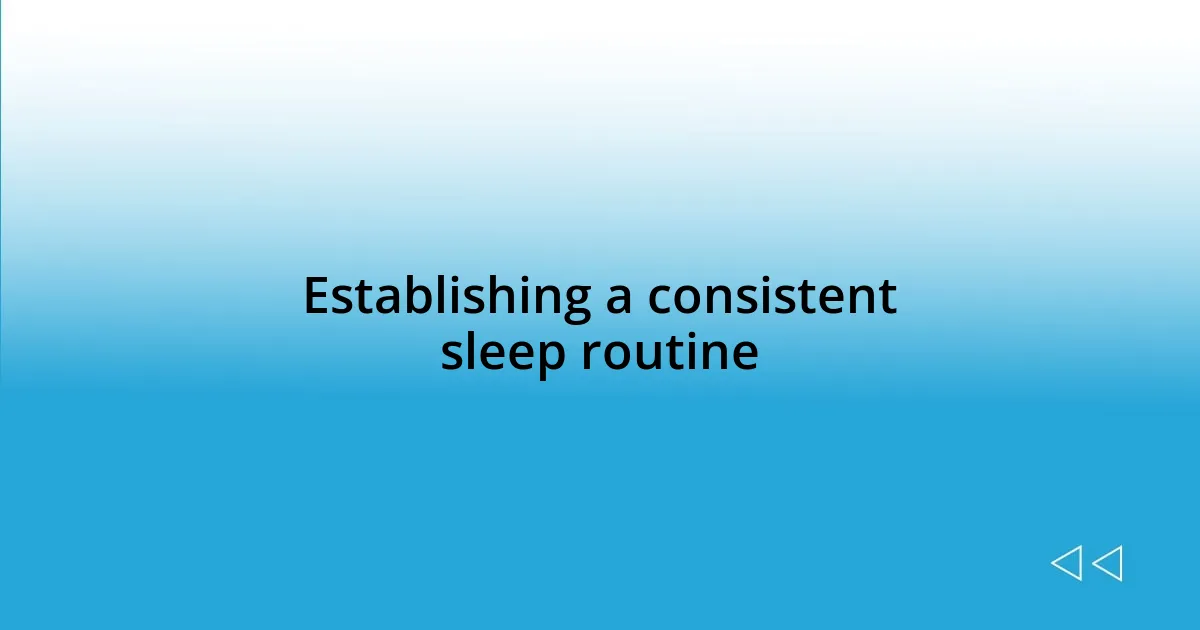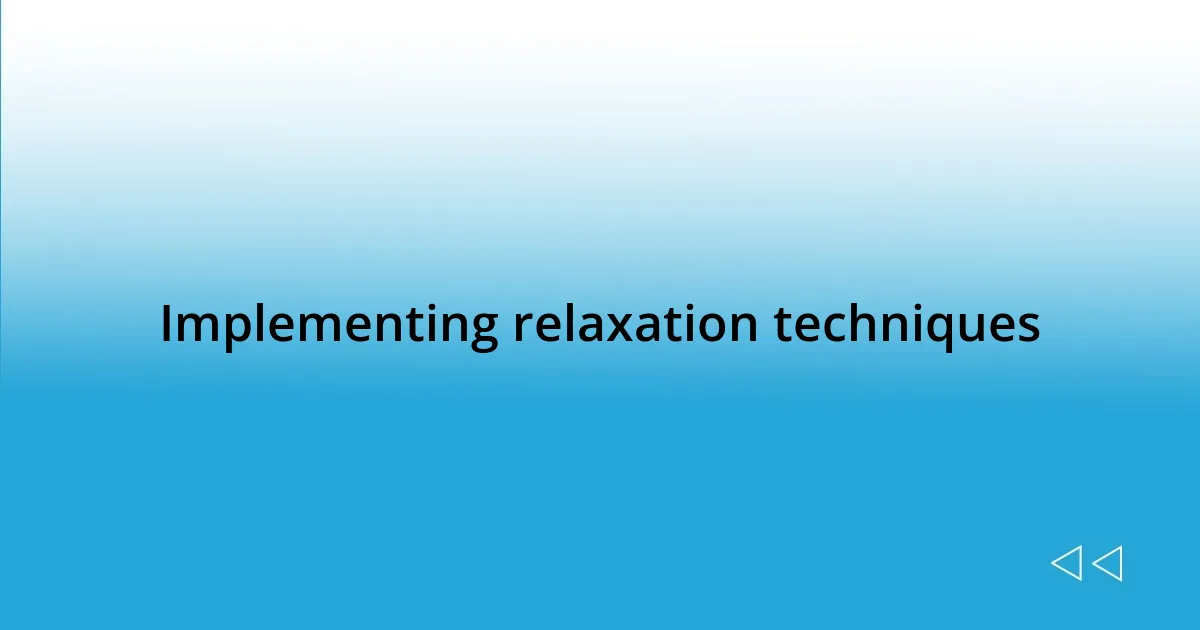Key takeaways:
- Sleep is essential for cognitive function, emotional stability, and overall health; quality sleep enhances productivity and mood.
- Identifying sleep challenges, such as inconsistent bedtimes and overstimulation, leads to significant improvements in sleep quality.
- Creating a sleep-friendly environment with proper light control, temperature, and soothing sounds can greatly enhance restfulness.
- Establishing a consistent sleep routine and implementing relaxation techniques are crucial for achieving restorative sleep.

Understanding the importance of sleep
Sleep often feels like an underrated superpower in our daily lives. I remember those nights when I thought I could function on just a few hours, only to wake up feeling less than human. How many times have you pushed through a day, fighting fatigue, and wondered why your brain feels cloudy? Sleep is critical for cognitive function, emotional stability, and overall health.
When I started paying closer attention to my sleep patterns, the difference was staggering. I noticed that well-rested mornings not only boosted my productivity but also improved my mood. Have you experienced that incredible clarity after a good night’s sleep? It’s fascinating how our bodies and minds crave rest, and when we deny them this essential need, the consequences can include heightened stress levels and decreased immunity.
Over time, I’ve come to appreciate sleep as a vital ingredient for personal well-being. Each hour of quality sleep enhances our creativity and ability to navigate life’s challenges. Isn’t it intriguing how a single night of deep sleep can reset our entire outlook? Understanding this importance has transformed how I prioritize my daily routine, leading to a more balanced and joyful life.

Identifying my sleep challenges
Identifying my sleep challenges was an eye-opening experience. Initially, I brushed off my struggles as just part of life, thinking late-night scrolling was harmless. But when I noticed my perpetual fatigue and irritability, I realized something had to change. I began tracking my sleep habits and found several recurring issues that contributed to my restless nights.
Here are some of the key challenges I identified:
– Inconsistent bedtimes: I often went to bed at different times, throwing off my body’s internal clock.
– Overstimulation before sleep: Those late-night Netflix binges left my mind racing, making it hard to unwind.
– Caffeine dependence: I loved my afternoon coffee, but I didn’t realize how it lingered in my system, disrupting my ability to fall asleep.
– Worries and stress: My mind would whirl with daily concerns, preventing me from drifting into a deep slumber.
Each challenge felt like a piece of a puzzle, and when I started addressing them one by one, I began to see improvements in my sleep quality.

Creating a sleep-friendly environment
Creating a sleep-friendly environment is crucial for enhancing the quality of your rest. I discovered that simple adjustments to my bedroom made a significant difference. For instance, I began with blackout curtains to block out early morning light. It’s remarkable how a dark space could lull my body into sleep mode much quicker. Do you have a nightstand cluttered with books, gadgets, or random items? I used to, but decluttering created a peaceful atmosphere, signaling to my brain that it was time to unwind.
Temperature also plays a vital role in creating an ideal sleep environment. Personally, I found that keeping my room slightly cooler made it easier for me to fall asleep. However, I had to experiment a bit to find the perfect temperature; what felt comfortable for me might not work for you. By using a fan and breathable bedding, I crafted a sanctuary that welcomed restful slumber. Isn’t it fascinating how such little tweaks can lead to a world of difference in our sleep quality?
Lastly, I realized the importance of sound and scent in my sleep zone. While some enjoy silence, I prefer the soothing hum of a white noise machine to mask any disruptive sounds from outside. I even integrated essential oils like lavender, which I learned can promote relaxation. Have you ever noticed how certain scents can evoke memories or feelings? It’s a personal touch that has transformed my bedroom into a retreat, making sleep not just a necessity but a true delight.
| Element | Impact on Sleep |
|---|---|
| Light Control | Blocks morning light, promoting quicker sleep onset |
| Room Temperature | Cool environments help to drift into sleep more easily |
| Sound | White noise can mask disruptive noises, creating a peaceful space |
| Scents | Aromatherapy enhances relaxation, making it easier to fall asleep |

Establishing a consistent sleep routine
Establishing a consistent sleep routine was transformative for me. I realized that having a regular bedtime not only trained my body to expect rest at certain times but also made it easier to wind down. One night, feeling the difference after just a week of going to bed at the same time, I thought, “Why did I wait so long to prioritize this?”
In my experience, a winding-down ritual has become essential. Each evening, I dedicated about 30 minutes to gentle activities, like reading or meditation, signaling to my mind that it was time to slow down. I often noted how those moments helped me shed the stresses of the day. Have you ever found that transitioning from chaos to calm can be so rewarding? I would urge you to try it; you’ll likely feel that shift too.
Moreover, I became quite intentional about my mornings to fortify this routine. Waking up consistently allowed me to feel more energized and focused throughout the day. On days when I stuck to my schedule, I noticed fewer struggles with morning fatigue. It made me wonder – with such a simple adjustment, could every one of us unlock better rest? I believe establishing a rhythm truly underpins better sleep, and it’s a journey worth embarking on.

Implementing relaxation techniques
Implementing relaxation techniques has been a game changer for my journey toward better sleep. I remember one particularly stressful week when I decided to try guided imagery meditation. Closing my eyes and envisioning a tranquil beach instantly transported me away from my worries. Have you ever noticed how powerful imagery can be? It’s like hitting a mental reset button, allowing me to unwind physically and mentally before slipping into slumber.
Another technique I embraced was progressive muscle relaxation. Honestly, I was skeptical at first. Yet, as I slowly tightened and then released each muscle group, I felt layers of tension melt away. It was a surprise to me just how much I had been holding onto. Isn’t it amazing how we carry stress without even realizing it? This practice became a comforting ritual, signaling to my body that it was time to surrender to sleep.
Lastly, I found that incorporating breathing exercises into my nightly routine was incredibly beneficial. By taking deep, intentional breaths, I felt my heart rate slow and my mind quiet. There were nights when just a few minutes of focused breathing transformed my restlessness into calm. Have you ever taken a moment to breathe and felt the world around you fade away? I can confidently say these techniques turned my nights into a serene experience; it’s like I finally discovered the key to unlocking quality rest.

Tracking my sleep progress
Keeping track of my sleep progress has been eye-opening. I started using a sleep diary, jotting down my bedtime, wake-up time, and how I felt each morning. It was interesting to reflect on trends—certain foods or activities seemed to coincide with better or worse nights. Have you found that simple act of logging can make a difference in awareness? I certainly did.
As I delved deeper, I also experimented with sleep tracking apps. The data they provided was fascinating—my sleep cycles, duration, and quality detailed in a colorful graph. One morning, after I noticed that I consistently woke up refreshed on days with less screen time before bed, I thought, “How much are my habits affecting my nights?” It sparked a desire in me to refine my evening routine even more.
What truly struck me, though, was how this tracking translated into motivation. When I saw improvements in my sleep score, it was a pat on the back that encouraged me to stick with my efforts. I’d often smile at the progress chart, feeling a sense of accomplishment. Isn’t it empowering to witness our own growth? Knowing I’m on a journey, not just aiming for perfection, has made this experience enriching and enjoyable.

Adjusting habits for better sleep
One of the first adjustments I made to improve my sleep was to establish a consistent bedtime. Initially, I resisted the idea, feeling that a rigid schedule was too constraining. But over time, I noticed that going to bed and waking up at the same time each day created a rhythm in my body that just felt right. Has anyone else noticed how much easier it is to fall asleep when your body knows what to expect?
Additionally, I reevaluated my evening habits, particularly my screen time. I used to scroll through my phone right before bed, thinking it would help me unwind. However, I soon realized that the blue light emitted by screens was a culprit in keeping me alert. Switching to reading a few pages of a book or even listening to calming music became my new norm. Are you aware of how small changes can have a significant impact on your sleep quality? It’s like flipping a switch; I discovered a cozy world waiting for me beyond the glow of my phone.
Lastly, I incorporated dietary adjustments into my evening routine. I stopped having heavy meals too close to bedtime, and I even eliminated caffeine in the afternoon. I remember one night indulging in a large dinner too late and tossing and turning until the early hours. Monitoring what I ate and when became an enlightening part of my journey—have you ever recognized how your diet affects your sleep? Now, I opt for light snacks like herbal tea and almonds, which truly make a difference. Embracing these shifts has led me to a more restful and restorative night’s sleep.
















